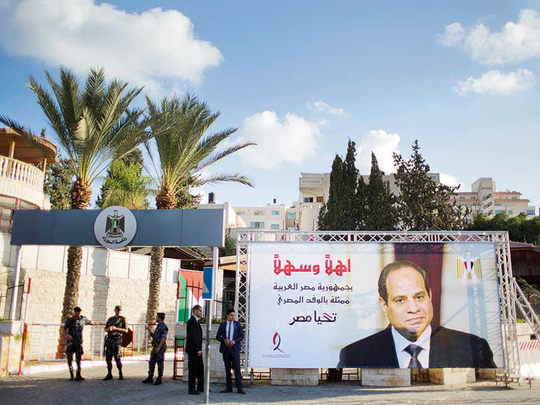
From high above a street corner, the smiling face of President Abdul Fattah Al Sissi gazes out over passersby, the air of paternal authority captured by an accompanying legend: “Long live Egypt.”
But this isn’t Cairo, it’s Gaza. The poster is testament to Al Sissi’s so far successful efforts to broker a reconciliation between long-feuding Palestinian factions, with critical talks resuming in Cairo yesterday.
He wants a deal to permanently halt the movement of militants between Gaza and Sinai, where a Daesh affiliate has damaged Egypt’s tourist industry as well as the broader recovery Al Sissi wants to portray. Ending the rift in Palestinian ranks could also ease Gaza’s suffering and bolster their hand in future peace talks with Israel. Put together, they point to an assertive Egypt looking to reclaim its role as a regional powerhouse.
There’s the “sense of wanting to re-establish Egyptian leadership and foreign policy activism — putting Egypt back in its rightful place,” said Michael Wahid Hanna, a senior fellow at the Century Foundation in Washington.
Arab Spring
From the early 1970s, Egyptian leaders predominantly allied with the US, receiving billions of dollars in economic and military assistance, and breaking with most of the Middle East to strike a historic peace treaty with Israel. Yet as the 2011 Arab Spring uprising led to three changes in leadership in as many years and economic decline, Egypt’s focus turned inward.
Egypt’s economic plight and the struggle to put an end to the violence drove the shift in foreign policy, especially when it comes to neighbours whose internal chaos threatens to undercut Egypt’s stability bid.
Egypt joined Russia in aiding Libyan commander Khalifa Haftar as the best hope for ending that country’s violent fracturing. Now Al Sissi’s wading into the thorny issue of reconciling Fatah and Hamas.
In return for help in stemming the flow of militants and weapons through underground tunnels that extended into Gaza, Egypt has loosened controls over the Rafah crossing, and dangled the prospect of a permanent opening of a border that serves as one of Gaza’s few lifelines to the outside world.
For the West Bank-based Palestinian National Authority, a full and lasting reconciliation with Hamas would revive its role as the sole representative of the Palestinians in any talks with Israel.
“All sides have an interest in making this a success. There are joint interests at stake,” said Tarek Fahmy, assistant director of the Cairo-based National Center for Middle East Studies.
A final deal is still some way off, though, and the vexed question of what will happen to Hamas’ armed wing could yet scupper Egyptian efforts.












